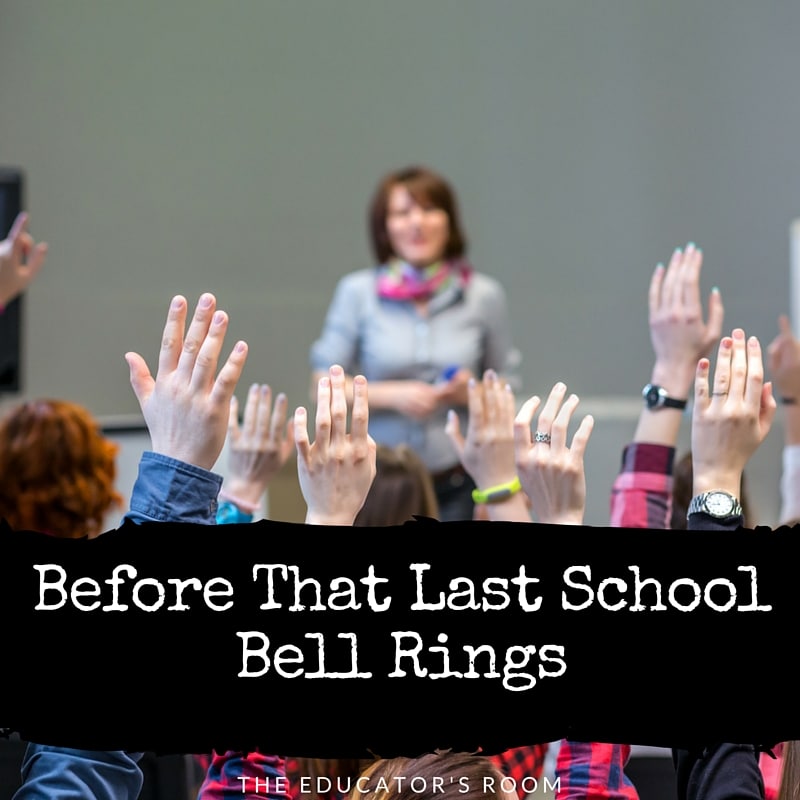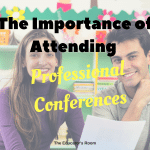The end of a school year arrives with both relief and trepidation for many teachers. Some are limping toward the finish line after a Spring of relentless testing cycles, struggles to get students to the point of mastery, threats of budget shortfalls, and general burnout from 60+ hour work weeks for the last 10 months straight. Others are leaping towards that end point with the joy of a deadline reached and celebration of another triumphant year. Whatever the case is for you, before that last bell rings and the school loudspeakers play Alice Cooper’s “School’s Out for Summer” (what, they don’t do that at your school?), consider making at least a basic plan for yourself as a professional. In a society where the public and the media don’t often consider educators as professionals, it is up to us to create that status for ourselves and our colleagues, and the end of the school year is a great time to consider ways to do this. Here are four important areas to plan for what to do after that last bell rings:
1. REST. In fact, one of the best ways to sustain your professional life and motivation is to rest, recuperate, and recover. The “breaks” during a school year might have held a few moments of rest or relaxation for some teachers, but for many, those breaks can turn into prolonged planning periods and work catch-up time. You haven’t had much opportunity over the last year to simply let go and relax without the looming pressure of coming lessons to plan, papers to grade, assessments to give, or meetings to attend. This is that time. Especially if you are launching into teaching summer school or must work another job over the summer to make ends meet, or if this year has concluded without the promise of a position in the fall, at least plan for and give yourself two weeks to “de-school.” De-schooling is a necessary process and one that is necessary for our brains to recharge and our feelings about our work to get perspective. Professionals in other career fields take at least two-week holidays each year, so that is a good measure by which to gauge the minimum you should allow for removal of the vestiges of the last year’s stress.
2. PLAN ADVENTURE. Whether you have to work this summer, attend conferences, seminars or other professional development, work with colleagues to plan for next year, or even if you have to look for a new position, it is important to make a plan now for an adventure for yourself at some point over the summer school break. By “adventure” I mean something completely different and separate from your previously scheduled rest period. An adventure is something you plan for yourself that takes you out of your regular environment and/or schedule, puts in you in an entirely new frame of mind, and gives you the opportunity to learn something new while experiencing fun at the same time. As teachers, we all acknowledge fun as an essential learning tool for our students, but how often do we apply that to ourselves? Yes, it’s a splurge and possibly a luxury to take a day and wander around a museum you haven’t been to in years, or take a road trip to a city that has a market you’ve never visited, or meet a friend that you haven’t seen in months. But it’s a splurge and luxury that has the benefit of re-energizing your mind and heart. Adventure is a way to find that one new thing you will learn about yourself that will tip the scales for you professionally as the new school year approaches.
3. SET ASIDE PERSONAL PROFESSIONAL DEVELOPMENT TIME. Educators often use summer months to plan for the coming year’s course work, develop new lesson ideas, or attend conferences that give them new teaching frameworks. But we often miss the opportunity to think of ourselves as professionals in our own right and in a career field where we have to create opportunities for advancement and leadership because those are not built into the way our profession works. So take some purposeful time this summer to update your resume and your LinkedIn profile. Make a list of professional connections and references you can rely on and who can speak to your successes. Consider ways to create or enhance your personal brand as a professional: what can you add to the body of work in our career field? Perhaps a book you can write based on your unique experiences or lesson plans you believe will help other teachers? Perhaps you can apply to speak at some upcoming conferences and begin to make some broader professional connections. Your abilities and your strengths extend far beyond just your classroom, and though that classroom may be where your heart is, returning to it is no longer a guaranteed part of being a teacher. Those of us who have faced lay-off, burn-out, budget cuts, transfers, and other difficult ways to lose our classrooms know that being caught unawares can be the worst part of that loss. Being smart about preparing yourself professionally for any contingency will make you more flexible and able to shift your career focus should the need arise. So polish off that Twitter account, spiff up that website, send in some proposals, and make time to be and feel like the professional educator that you are.
4. TEACH SOMEONE SOMETHING. It sounds completely counter-intuitive to plan an opportunity to teach when you are on your summer break, I know. But I’m not talking about walking into a classroom or seminar and teaching the subjects and topics you are familiar with. I’m talking about finding opportunities to teach people outside of your normal audience something outside your normal content area. You are a skilled educator. Your gift is teaching, training, guiding, and fostering a love of learning. Practicing those skills on an entirely different audience than the one you are used to can open your eyes, your mind, and your heart to not only what else is out there, but can also show you the source of your own motivations. It’s hard to get ahold of those original reasons we wanted to teach when we are neck-deep in the grime of a school year. It’s also hard to get ahold of those reasons if we shrug that school year off and completely remove ourselves from who we are during the summer break. But if we find a way to share some knowledge with someone, mentor a younger person, coordinate a summer book group, or speak at a conference, there is an amazing bubbling of energy that comes from that experience. It reminds us that we are good at teaching; that we do make a difference in the way others see the world. And it shows us that we are unique in our ability to make other lives better… because we are teachers.
Making these purposeful plans and giving yourself these experiences before the summer really kicks off is a gift that can help you gain perspective on where you want to go professionally. If you have been tossed into a world of uncertainty because you don’t know what work you will have next year, these experiences are also crucial for grounding yourself and finding a starting point for the next chapter in your professional life. Whether you return to the same classroom next fall or not, you are still an educator — a skilled and experienced professional — and taking these steps for yourself will prepare you for whatever comes next.







